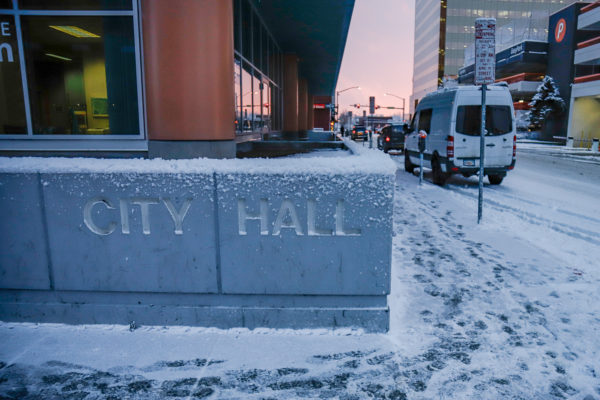
The city of Anchorage has spent nearly $9,000 on new anti-panhandling signs, but the law the signs refer to was found unconstitutional nearly a decade ago.
The signs began showing up last month at busy Anchorage intersections where pedestrians sometimes solicit money from drivers stopped at red lights, the Anchorage Daily News reported Friday.
Mayor Dave Bronson made cracking down on low-level infractions sometimes associated with homelessness a priority of his campaign before taking office in July.
The signs warn: “Panhandling prohibited on median or roadway” and urge motorists to instead donate money to charities.
The signs also cite a city ordinance and part of a state law when warning that panhandling is illegal. But a note in the municipal code says the Alaska Superior Court found the ordinance unconstitutional in 2014.
Brice Wilbanks, the mayor’s former campaign manager and now a city government staffer, first approached the city’s traffic engineering department about the signs, city ombudsman Darrel Hess wrote in an email to Assembly member Kameron Perez-Verdia.
The traffic engineering department ordered 200 of the panhandling signs. The public works director was unaware of the court ruling when he had the signs made, the memo said.
It’s not clear when the signs started going up, but the ombudsman started receiving complaints about them in December. So far, 68 of the signs have been posted at 20 intersections at a cost of $8,689.
“I expressed my concerns with the MOA placing signs in public spaces that reference a section of code that has been held to be unconstitutional by the Court,” Hess wrote.
[Sign up for Alaska Public Media’s daily newsletter to get our top stories delivered to your inbox.]
The signs are meant to “keep pedestrians away from dangerous situations in the roadway,” Bronson’s spokesperson Corey Allen Young told the Anchorage newspaper.
A legal review of the signs is underway, city attorney Patrick Bergt said.
“We are aware of concerns related to designs, we’re addressing as needed, and will remedy if needed, as soon as possible.”
The signs also came as a surprise to the Anchorage Police Department, whose officers are not citing anyone for panhandling, said Police Chief Ken McCoy.
Police haven’t cited anyone for panhandling in years, said police spokeswoman Sunny Guerin.
However, three people have been cited since 2020 under a different ordinance that prohibits people soliciting or collecting contributions from occupants of vehicles in roadways, said another police spokesperson, Renee Oistad. It was not clear why this ordinance was not cited on the signs.
When asked why the city didn’t coordinate with the police department and if the remainder of the 200 signs would be posted, Young said “coordination and discussions” are ongoing on both topics.




